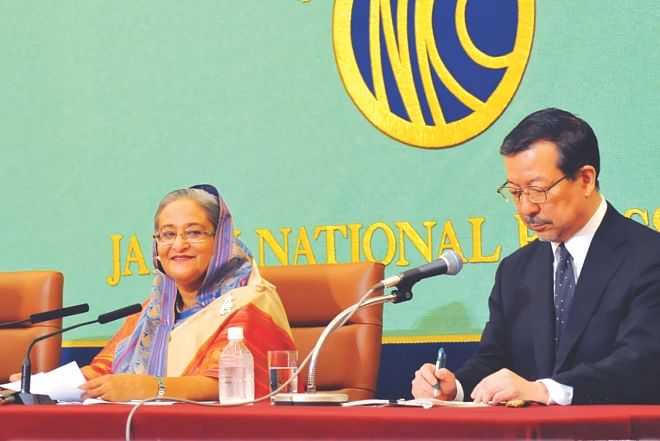Hasina for good ties with India
Hasina for good ties with India
Problems could be solved thru' talks, she tells Japanese journalists

Voicing hopes of keeping up good relations with India, Prime Minister Sheikh Hasina yesterday said any problem with neighbouring countries could be resolved through bilateral talks.
"You may have differences over policy, it's quite natural. If there's any problem you can solve them through bilateral discussions," she said.
The prime minister made the remarks while interacting with the Japanese media at the National Press Club of Japan on the last day of her four-day official visit.
When a Japanese journalist asked her whether there would be any hindrance to Bangladesh-India relations with Narendra Modi becoming the new Indian prime minister, Hasina said India is Bangladesh's next door neighbour.
"I believe we'll be able to keep up a good relationship ....he [Modi] has his own ideas. Now he has become Indian prime minister and I hope as prime minister of India he will play his due role so that all neighbouring countries have good relations," she said.
Sheikh Hasina added, "I know how to protect my people's safety and wellbeing… I know India is a big country and maybe we're small geographically. But, considering (our) population, we're a big country."
In this connection, she mentioned the signing of the Ganges water sharing treaty with India during her first tenure in 1996.
"Our foreign policy is very clear, friendship to all and malice to none. Since we formed the government, we've had good relations with our neighbours," she said.
Hasina said she, in her three terms, had worked with four Indian governments, and the latest Modi government is the fifth one. "I always say our common enemy is poverty and we've to fight against poverty together."
In reply to a question on whether Bangladesh would extend its support to Japan for a non-permanent seat in the UN Security Council, the premier said Bangladesh and Japan were two friendly countries and Dhaka greatly valued its friendship with Tokyo.
In this connection, she mentioned that Japan was very much with Bangladesh during the Liberation War in 1971. "Not only the common people of Japan, bur even its schoolchildren contributed their tiffin money for the refugees and their children."
Hasina said when the Father of the Nation, Bangabandhu Sheikh Mujibur Rahman, began rebuilding the war-ravaged nation, Japan was one of the first few countries which came forward to help and cooperate with Bangladesh.
The premier said she had already invited Japanese Prime Minister Shinzo Abe to visit Bangladesh and hoped he would visit Dhaka at the end of August this year.
Earlier, in her written speech before the Japanese press, Hasina said following her fruitful discussions with Shinzo Abe, she and the Japanese leader had launched the Japan-Bangladesh comprehensive partnership by elevating the friendly relations between the two countries to a higher level.
The premier said she also requested Abe to help build several mega infrastructure projects to keep up the momentum of Bangladesh's development and progress.
Japan also reaffirmed its support toward establishing a Peace Building Centre in Bangladesh as a symbol of the two countries' cooperation in UN peacekeeping and peace-building efforts, she said.
Talking about bilateral trade and commerce, Hasina said she had requested the Japanese premier to remove the existing trade imbalance. Prime Minister Abe assured her of considering the issue sincerely, she said.
Hasina also referred to the signing of an MoU between the two countries on providing 40 industrial plots and two factory buildings for Japanese entrepreneurs in five EPZs of Bangladesh.
She thanked the Japanese Press Club authorities for preserving the signature of Bangabandhu which he had signed in the visitor's book during his visit to the press club on October 29, 1973.
PM's Media Adviser Iqbal Sobhan Chowdhury, Principal Secretary Abdus Sobhan Sikder, Foreign Secretary Shahidul Haque, among others, were present on the occasion.